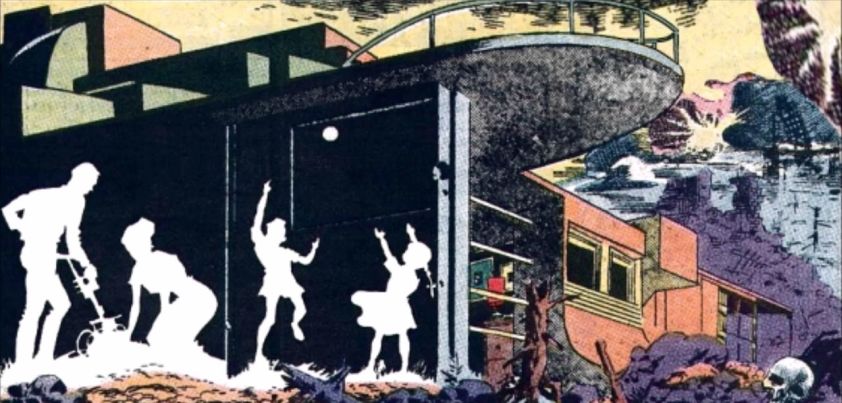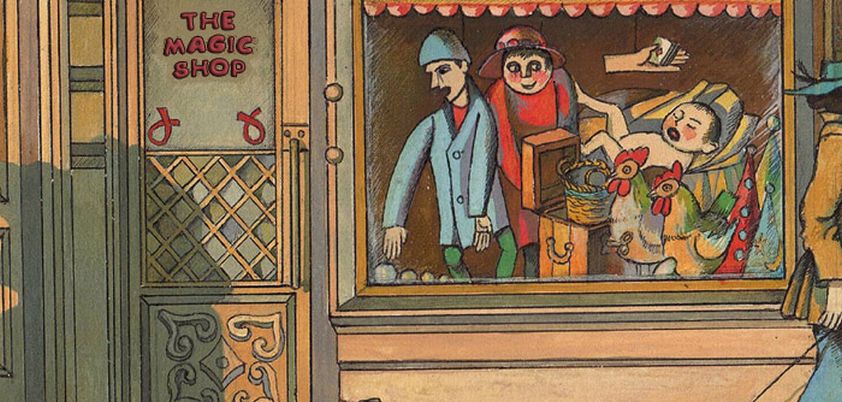 This science-fiction story from Ray Bradbury chronicles the last day in the ‘life’ of an automated house that has survived nuclear war. Although the house’s inhabitants are dead, represented by shadows on the outside walls, it has continued its daily cycle of programmed activity. Major themes are the danger of nuclear war, and the consequences of taking technology too far. In replacing almost all human tasks in their daily life, the householders were dependent on technology. Ironically, that same technology built the bombs that destroyed them. Other themes include death (the dog, house and humankind), nature (the only survivor), dystopia. More…
This science-fiction story from Ray Bradbury chronicles the last day in the ‘life’ of an automated house that has survived nuclear war. Although the house’s inhabitants are dead, represented by shadows on the outside walls, it has continued its daily cycle of programmed activity. Major themes are the danger of nuclear war, and the consequences of taking technology too far. In replacing almost all human tasks in their daily life, the householders were dependent on technology. Ironically, that same technology built the bombs that destroyed them. Other themes include death (the dog, house and humankind), nature (the only survivor), dystopia. More…
Wedding Night
 In this touching story by Sait Faik Abasıyanık, a Turkish father belatedly registers the birth of his sixteen-year-old son so he can get married. Fortunately, the boy looks much older than he is. The minimum marriage age is twenty, and he must be registered as being twenty-four because his bride, who he has never seen, is twenty-six! The poor boy has been plied with alcohol, and is trembling like he did at his circumcision four years earlier. After a shaky start, they emerge from the bridal chamber happy. Themes include tradition, arranged marriages, naivety, anxiety, confusion. More…
In this touching story by Sait Faik Abasıyanık, a Turkish father belatedly registers the birth of his sixteen-year-old son so he can get married. Fortunately, the boy looks much older than he is. The minimum marriage age is twenty, and he must be registered as being twenty-four because his bride, who he has never seen, is twenty-six! The poor boy has been plied with alcohol, and is trembling like he did at his circumcision four years earlier. After a shaky start, they emerge from the bridal chamber happy. Themes include tradition, arranged marriages, naivety, anxiety, confusion. More…
The Stains
 The major themes of this unsettling horror story from Robert Aickman are grief, ‘romance’ and death. With many twists and turns along the way, a grieving widower becomes infatuated with an enigmatic, nymph-like girl he meets in the woods. As their steamy romance plays out, he and everything around him begin to be covered in strange, lichen-like stains. In typical Aickman style, rather than a denouement that ties things nicely together, the abrupt conclusion leaves the reader with more questions than it answers. Other themes: innocence, lust, modern vs. rustic lifestyle, denial (of the stains). More…
The major themes of this unsettling horror story from Robert Aickman are grief, ‘romance’ and death. With many twists and turns along the way, a grieving widower becomes infatuated with an enigmatic, nymph-like girl he meets in the woods. As their steamy romance plays out, he and everything around him begin to be covered in strange, lichen-like stains. In typical Aickman style, rather than a denouement that ties things nicely together, the abrupt conclusion leaves the reader with more questions than it answers. Other themes: innocence, lust, modern vs. rustic lifestyle, denial (of the stains). More…
The Magic Shop
 This delightful fantasy from H. G. Wells is about ‘magic’ and perception. A father and son enter a strange Magic Shop. As they begin to look around, the shopkeeper appears and entertains them with some ‘magic’. The innocent boy watches in awe, while his skeptical father looks for the sources of trickery. The pair moves further into the store and witness additional, seemingly impossible wonders. The father, realizing that what he sees may be real, becomes increasingly uncomfortable and begins to suspect the presence of unnatural forces. Themes: childhood innocence and wonder, father-son relationships, trickery vs. the supernatural. More…
This delightful fantasy from H. G. Wells is about ‘magic’ and perception. A father and son enter a strange Magic Shop. As they begin to look around, the shopkeeper appears and entertains them with some ‘magic’. The innocent boy watches in awe, while his skeptical father looks for the sources of trickery. The pair moves further into the store and witness additional, seemingly impossible wonders. The father, realizing that what he sees may be real, becomes increasingly uncomfortable and begins to suspect the presence of unnatural forces. Themes: childhood innocence and wonder, father-son relationships, trickery vs. the supernatural. More…
Shhhh
 In this story by NoViolet Bulawayo, a Zimbabwean girl is full of hatred when her father returns home terminally ill after years of no contact or family support. He is totally helpless and, because of his condition (AIDS), her mother forbids her to tell anyone he is back. There are few secrets in an African slum and, when her friends insist on seeing him, she fears they will treat him cruelly. To her surprise, they are respectful, gentle and caring, which begins to turn her feelings around. Themes include abandonment, hatred, fatal illness (AIDS), shame, secrecy, compassion, religion, church greed/corruption. More…
In this story by NoViolet Bulawayo, a Zimbabwean girl is full of hatred when her father returns home terminally ill after years of no contact or family support. He is totally helpless and, because of his condition (AIDS), her mother forbids her to tell anyone he is back. There are few secrets in an African slum and, when her friends insist on seeing him, she fears they will treat him cruelly. To her surprise, they are respectful, gentle and caring, which begins to turn her feelings around. Themes include abandonment, hatred, fatal illness (AIDS), shame, secrecy, compassion, religion, church greed/corruption. More…